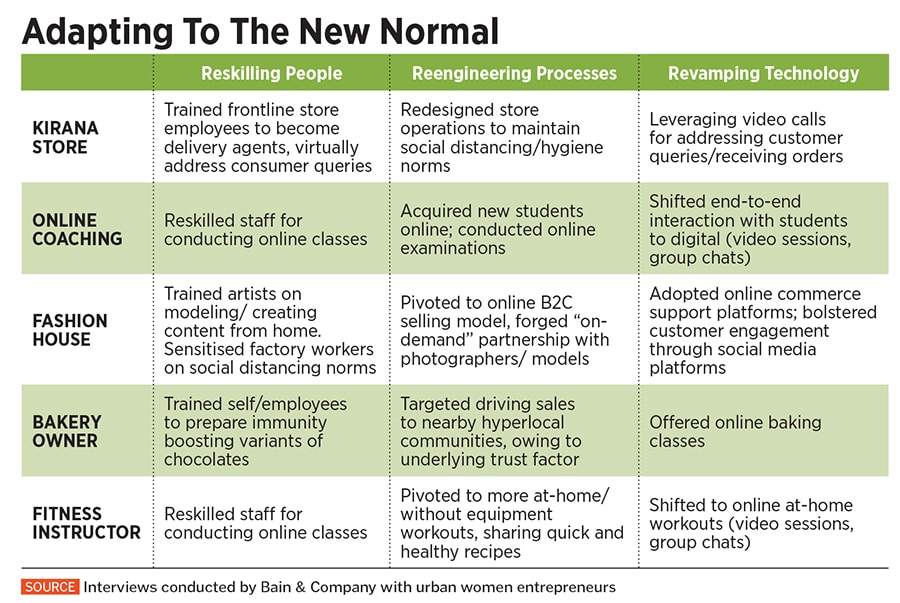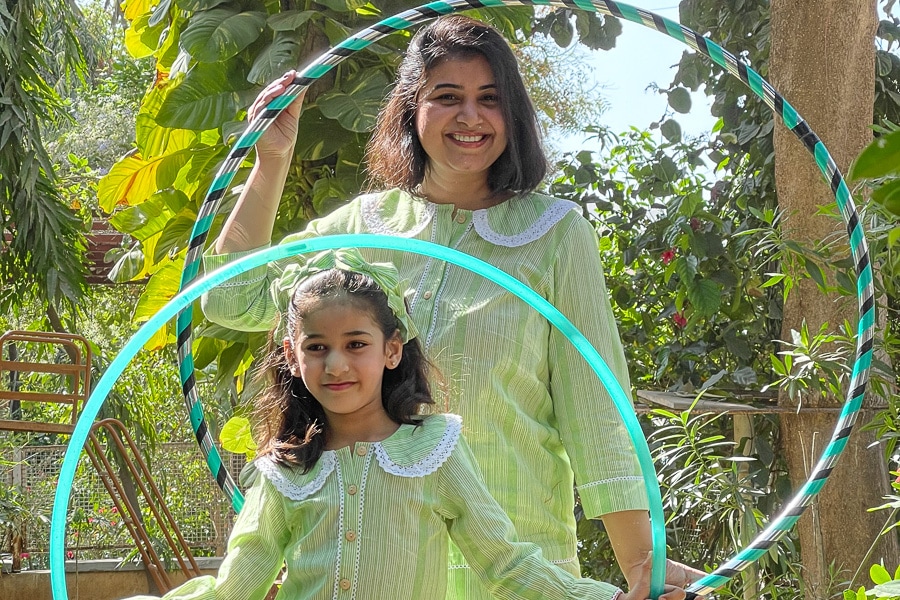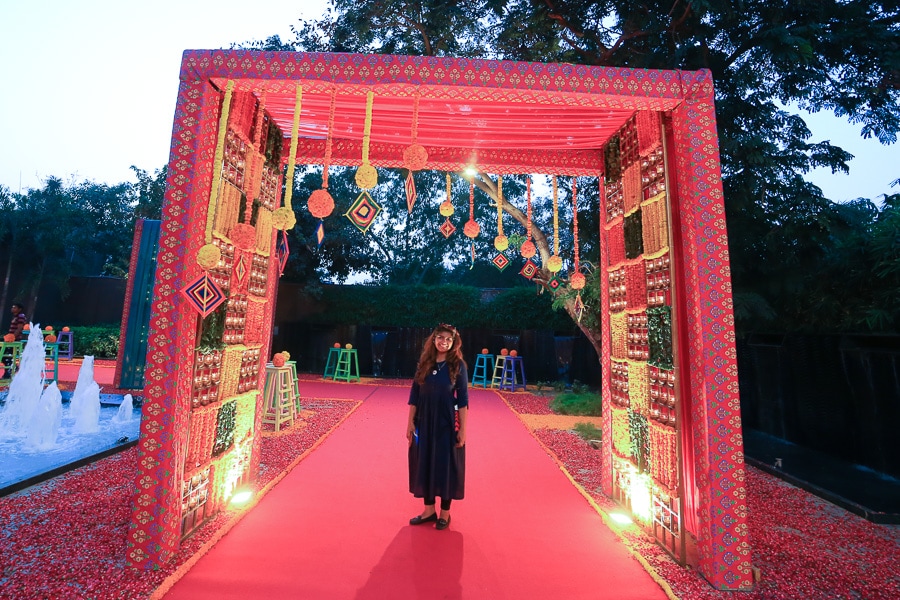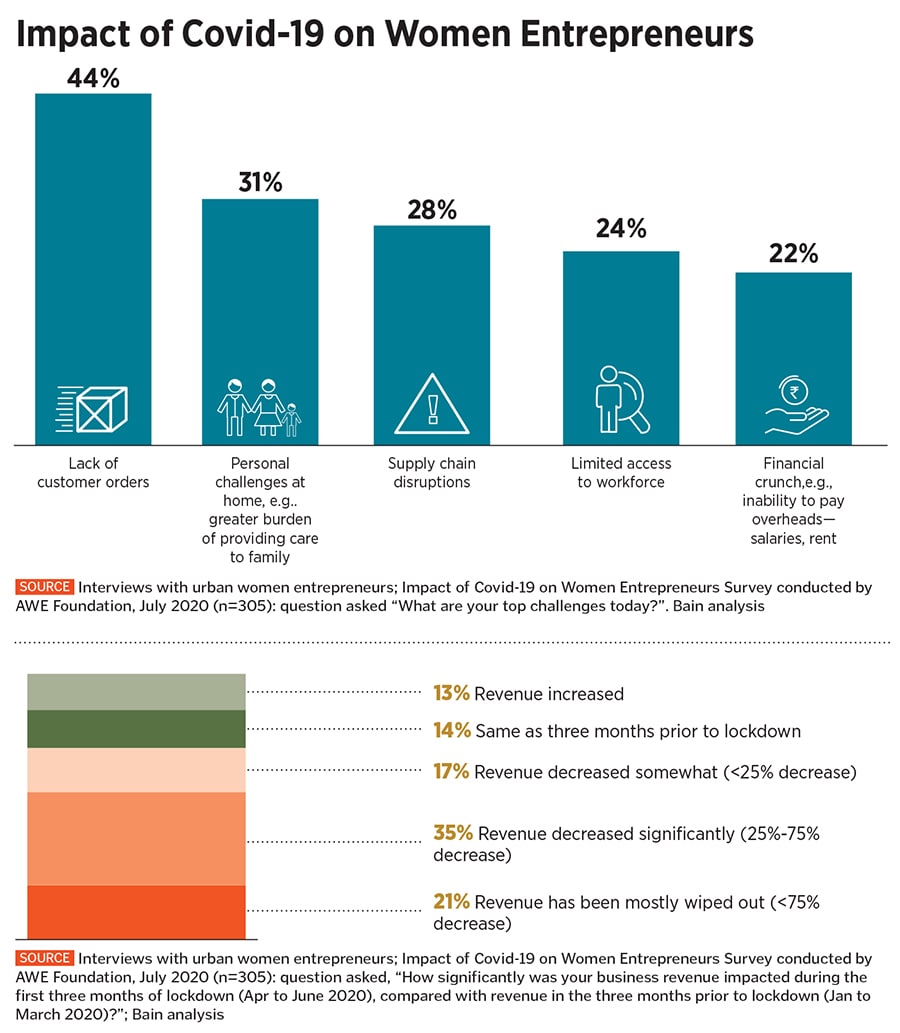Nikita Nikalje started her PR agency specialising in hospitality in July 2018. For over two years, her venture, The Communication Room, worked with several brands, restaurants and hotels in Mumbai. Just when she was thinking of scaling up operations, 2020 brought with it the Covid-19 pandemic, putting a spanner in the works.
“A complete lockdown was declared on March 23, 2020, shutting down all restaurants and cafes… it made me lose all my clients. In a matter of a few hours, I went from running a successful agency with 30 clients, 10 employees, and a turnover of more than Rs8 lakh per month to nothing at all,” rues Nikalje, who had to shut down her business during the initial months of the lockdown. “Nobody knew how long this ordeal would last and I was unsure about how to sustain this business.”
Today, India has 13.5 to 15.7 million women-owned enterprises which is less than 20 percent of all businesses. Single-person businesses provide direct employment to an estimated 22 to 27 million people. After an abrupt drop in March and April 2020 due to the lockdown, growth in businesses for women entrepreneurs as of October 2020 was about one-third of pre-Covid-19 levels.
With an uncertain future and no business for months, Nikalje thought of giving up on her venture. “Like most entrepreneurs in my field of work, I thought of applying for a job at a bigger agency, but somewhere I realised that was not my calling,” she says. Instead, the 30-year-old from Mumbai invested time in understanding fashion and beauty PR, and started networking with professionals from those industries. “I knew I had to diversify to survive. Our agency—that we restarted and diversified—had to become industry-agnostic and our reach had to expand beyond Mumbai,” she says.
"The pandemic created a surge of home-based businesses, and many of them needed help in navigating the digital world. Limited by their output, potential and budget, I created an offering that delivered value to such clients. We started helping small businesses scale their operations and reach a bigger audience. That"s when we found our spot in a dynamic business environment,” explains Nikalje, who gained 15 new clients from Mumbai, Delhi and Hyderabad, and has six employees since November 2020.
“During the pandemic, we learnt that diversification is the key to stay afloat. On one hand, we worked with a home-baker for six months, who is now in the process of opening a cloud kitchen, and will eventually open a café. On the other hand, we helped bigger brands revisit their digital strategy, regardless of their industry. We are now working with many such clients and helping them innovate in their micro-markets, and scale across the country,” she says. In 2019, Nikalje’s startup made around Rs65 lakh whereas in 2020, the figure was a paltry Rs8 lakh.
With the second wave of Covid-19 pandemic at its peak, the Maharashtra government has imposed lockdown-like restrictions. For Nikalje, the consequences this time won’t be as severe. “This time, around 30 percent of my clients have put their services on hold, but for 70 percent, the business remains unaffected. Even if the government decides to go into a nationwide lockdown again, we will look for opportunities in the chaos, and find a way to deliver value,” she says.
Like Nikalje, many women entrepreneurs have had to diversify and digitise operations to stay afloat during the pandemic. As per the study released by Bain & Company in October 2020, 54 percent of the women interviewed had changed their business model in response to the pandemic, and another 24 percent planned to make a change by December 2020.
![box1 box1]()
Siddhi Shah, a 34-year-old design entrepreneur who ran a kids" apparel studio named Giggleo Designs in Ahmedabad, Gujarat, had to shut it down due to the pandemic. “Covid-19 brought the business to a screeching halt. A lockdown which was initially planned for 15 days went on for months and during the first three months of the lockdown, there was zero revenue. Working capital was hugely affected, stock piled up and costs started weighing on me so much that we had to shut down our studio space in June 2020,” says Shah, adding that as the restrictions eased, she organised a few exhibitions, but no one turned up.
To survive, Shah digitised her venture. “We designed a three-pronged strategy. First, we slashed our extra expenses by closing down our studio space. Second, we built a sustainable solution by launching an ecommerce platform during the nationwide lockdown, hence expanding our reach to pan-India. Third, we worked extensively on our social media strategy,” says Shah. Over the next couple of months, the strategy began yielding results, and revenues streamlined. “The plan was to set things right before Rakhshabandhan and have a good run till Diwali. It worked. It solved our working capital crunch, which further lubricated the cash flow, and we were able to grow our stock, in breadth and volume,” she adds.
![2.siddhi shah-bg 2.siddhi shah-bg]() Siddhi Shah, Founder, Giggleo Designs
Siddhi Shah, Founder, Giggleo Designs
While the end of 2020 was in Shah’s favour, since March 2021, she is again tackling the obstacles brought in by the exponential rise in the number of Covid-19 cases. “The second wave has dampened the spirit of customers as we are once again under lockdown… people can’t travel or go out, and that has again negatively impacted business as apparel becomes the least priority when it comes to shopping in the time of crisis,” she says. Giggleo Designs saw 1.5x growth in January and February 2021, but in April alone, the business has witnessed a 70 percent decline in new orders.
The Bain & Company study points out that in addition to low (and falling) female labour force participation rates, women experience three times more unemployment than men. The proportion of unpaid women workers in India (66 percent) is much higher than that of men (12 percent). The Covid-19 pandemic cost many women their jobs. While some decided to take on household responsibilities as the entire family is now at home, some decided to start new ventures.
![3.nikita kotecha_1a7653-bg 3.nikita kotecha_1a7653-bg]() Nikita Daksha Kotecha, Founder, Details by Nikita Kotecha
Nikita Daksha Kotecha, Founder, Details by Nikita Kotecha
When Nikita Daksha Kotecha, 25, lost her job because of the pandemic, she started a wedding planning business. “I started promoting intimate weddings on my Instagram account. Gradually, I got a good response and several inquiries. I was jobless, so I took the risk of starting my own venture, ‘Details by Nikita Kotecha’,” she says. Kotecha worked on creating wedding experiences for small gatherings. “It is a step away from the normal industry standard of the ‘big fat Indian wedding’… it is about making the event a one-of-a-kind experience, but for a smaller group. The idea is to go ‘big-fat’ with the details for a family,” she explains.
Since the inception of the business in July 2020, Kotecha has faced a number of obstacles. “We are service providers, but our services are not considered ‘essential’, so adapting to the new normal has been difficult. It’s still hard to expand in this sector,” she says. Working for virtual events, and organising intimate celebrations with limitations on capacity, and last-minute cancellations have made survival tough for her startup. “There have been policy changes every few days since the beginning. Organising everything has become more expensive because there are fewer guests. The spending capacity has gone down by 70 to 80 percent and in turn our earning caps too. There have been times when I planned for an event and ended up executing a different one, with different costs, and even ended up bearing losses because of the sudden new regulations due to the pandemic,” she adds.
The pandemic, however, also opened up new avenues for Kotecha. “Gifting has become a crucial part of events now, since inviting everyone is not possible and wedding favours are one way of making guests a part of events. This brought in new opportunities for me for not just wedding-related events but also planning gifting options for businesses. I’m also a gifting consultant now another feather in the cap,” she says. Kotecha says if she had started her business in the pre-pandemic years, there was a high chance her venture could not have been successful. “In a normal year, I would have faced more challenges as budgeted clients would not take the risk of hiring a new company or try to take advantage monetarily by negotiating on my fees… because of Covid-19, many of the premium event planners denied reducing their fees which helped my company grab the opportunity,” she says, adding that if her estimated profits were around Rs8 lakh in 2020, they would have been as less as Rs3 lakh in a normal year.
The second wave of the pandemic is proving to be more infectious than the first in India. And the wedding business has come a halt once again. “Business is crashing like never before as guests do not want to be a part of any gathering. Weddings in Udaipur, Mussoorie and Goa are getting cancelled or postponed,” she says, adding that now people are getting married with as few as 10 people which is wiping out business for the event management industry and associated vendors. “If the second wave stays for a long time, most people in the event management business will switch to other professions as it is difficult to wake up every day, start from scratch and lose it all at the end of the day,” she says.
omen entrepreneurs working in travel have been among the worst hit by the pandemic. Hardi Oza Patel, 35, a chemical engineer-turned-travel entrepreneur, started Velvet Escapes and Atara in July 2008. She curated itineraries for experiential and exotic travel plans which she had to stop as there were no buyers in the first half of 2020. Oza used the initial months of the lockdown to build contacts. “For the first half of 2020, travel was the last thing someone would think about. So I decided to work on my connections. I got in touch with top businessmen, production houses, corporate houses and numerous OTT platforms so that I could resume operations once the situation got better,” she says.
By June 2020, as restrictions eased, Oza started travelling across the country to find hidden spots to create unique offerings. “I started looking for places that wouldn’t be as crowded as the mainstream travel destinations which was the only possible selling point during the pandemic,” she says. Oza, who used to make a profit of around Rs18 lakh since June 2020, has made only around Rs2 lakh of late. “Right now there are no profits. Whatever I’m earning is used to meet the overhead expenditure. I don’t think I can earn profits for another year or so,” she adds.
![box2 box2]()
A study by Global Alliance for Mass Entrepreneurship and LEAD at Krea University, Andhra Pradesh, released in November 2020 highlighted the impact of the Covid-19 crisis on micro-enterprises in India. Around 43 percent of women-owned enterprises in the survey fell in the category that reported less than Rs10,000 profit a month whereas only 16 percent of those owned by men fell in this category.
Similarly, 40 percent of women-owned enterprises are self-run with no workers the corresponding number for men is 18 percent, the study said. Despite the adversity, 19 percent of the sample reported scaling up their businesses, showcasing immense resilience. In the study, which predominantly covered women enterprises in urban and semi-urban areas, low sales and reduced customer footfall were reported by 79 percent of female entrepreneurs.
For some women entrepreneurs, the business objectives during the pandemic have been much beyond making profits. Monami Dutta, a 56-year-old resident of Mayur Vihar, Delhi, ran Mona Sweets, a bakery that she had to shut down as there were no buyers. The proceeds from the bakery were used to feed close to 300 stay animals in the area. “For the past six years, I have been feeding stray dogs and a few cats and cows. It has been an expensive affair and my sweets business was instrumental in sustaining this crucial activity,” says Dutta.
![hardi oza patel_1843-bg hardi oza patel_1843-bg]() Hardi Oza Patel, Founder, Velvet Escapes and Atara
Hardi Oza Patel, Founder, Velvet Escapes and Atara
Dutta started a cloud kitchen to deliver meals with the aim to continue feeding stray animals. “Even though the meals required more of my time and effort to prepare than the sweets, I knew this was the only way to keep my business afloat,” she says. The possibility of another lockdown in Delhi leads to an uncertain future for Dutta. “Financially, a second lockdown would be disastrous for me, and other small businesses like mine. But I am also spotting new opportunities in cloud kitchens and collaborative services. The purpose of my business is to feed those 300-plus dogs who are dependent on me… it"s for them that I"ll keep finding ways to run my business and secure an income,” she says.
Over the last year, business model shifts have included new products or services, digital sales and delivery channels as well as a reoriented supply chain and sales and marketing functions. Entrepreneurs are also focusing on re-training themselves and their staff by learning new skills to adapt to the ever-changing nature of the pandemic.
For Oza, like most of the women entrepreneurs, the aim is to survive. “Many people have given up on their startups due to the pandemic, but the key is to pivot or innovate to make sure we are in business for the time being. Going forward, things will get better as India streamlines the vaccination process. The focus for micro-entrepreneurs right now should be on survival… we have the coming years to grow,” says Oza.

 Nikita Nikalje, Founder, The Communication Room
Nikita Nikalje, Founder, The Communication Room
 Siddhi Shah, Founder, Giggleo Designs
Siddhi Shah, Founder, Giggleo Designs Nikita Daksha Kotecha, Founder, Details by Nikita Kotecha
Nikita Daksha Kotecha, Founder, Details by Nikita Kotecha
 Hardi Oza Patel, Founder, Velvet Escapes and Atara
Hardi Oza Patel, Founder, Velvet Escapes and Atara